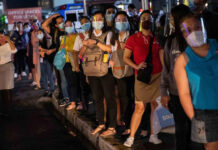Dr. Hamad Eid Al-Rumaihi, Director of the Health Protection and Communicable Disease Control Department at MoPH
The Ministry of Public Health (MoPH), in cooperation with the Hamad Medical Corporation (HMC), the Primary Health Care Corporation (PHCC), Sidra Medicine and the private health sector, celebrates the World Immunization Week during the period from April 24 to 30.
This year’s celebrations are organized under the theme “A Long Life for All”, which was selected by the World Health Organization (WHO).
The celebration aims to highlight the importance of access to vaccines and how immunization can save the lives of community members from fatal diseases, as well as support community members and their children to obtain immunization against vaccine-preventable diseases.
In this context, awareness is intensified through various types of media with the aim of raising public awareness on the importance of vaccination, its vital role in eliminating contagious diseases, and increase vaccination rates. In addition, awareness messages will be displayed on screens inside several malls, PHCC centers and private clinics as well as disseminating awareness messages on vaccines on social media.
On this occasion, Dr. Hamad Eid Al-Rumaihi, Director of the Health Protection and Communicable Disease Control Department at MoPH, said that vaccination is considered as one of the most successful interventions in the field of public health as they boost the human immune system and provide protection against infectious diseases that can cause serious illness and fatal complications.
Dr. Al-Rumaihi added that Qatar’s national vaccination program is one of the best in the world in terms of the quality of the vaccines used and the high coverage rates. This prompted the World Health Organization to praise the program as one of the best in the world in terms of efficiency, noting MoPH’s keenness to introduce all the latest vaccines in the world on an ongoing basis.
Dr. Muna Al Maslamani, Medical Director of the Communicable Disease Center at HMC, says immunizations are an effective and affordable means of protecting individuals and whole communities from a range of diseases.
“Routine vaccines are our greatest tool in the battle against infectious diseases. They are an affordable and effective means of protecting not just individuals but whole communities from debilitating diseases by making people immune or resistant to them by stimulating the body’s own immune system. Immunizations help keep our wider community protected, especially our most vulnerable community members – children, pregnant women, older adults, and patients with chronic diseases,” says Dr. Al Maslamani.
Dr. Khalid El-Awad, Director of the Health Protection Department at PHCC said that the PHCC, in collaboration with the MoPH, provides vaccination services to citizens and residents across all PHCC centers to various groups, including children, adults and tourists in Qatar. Vaccination services are provided.
“Achieving high immunization rates in the State of Qatar contributes to protecting members of society from diseases and enhancing their immunity, which is in line with the efforts of the health sector in the country,” added Dr. Al Awad.
Dr. Soha Al Bayat, Head of Vaccination at the MoPH, explained that the national vaccination program for both children and adults is periodically reviewed and updated to conform to the latest developments from the World Health Organization or relevant international bodies.
Dr. Suhi Al Bayat added that MoPH’s Immunization Section plays an important role in achieving the objectives of the Department of Health Protection and Communicable Disease Control, and implementing the general strategy of the Ministry, as it is responsible for following up and updating the national vaccination program and vaccinating adults and travelers.
During 2020, the 73rd World Health Assembly approved the 2030 Agenda for Immunization. Developed by WHO and immunization partners, the vision calls for wider access to vaccination at all stages of life; It was seen as one of the strategic priorities of this new decade.
Source: MOPH









